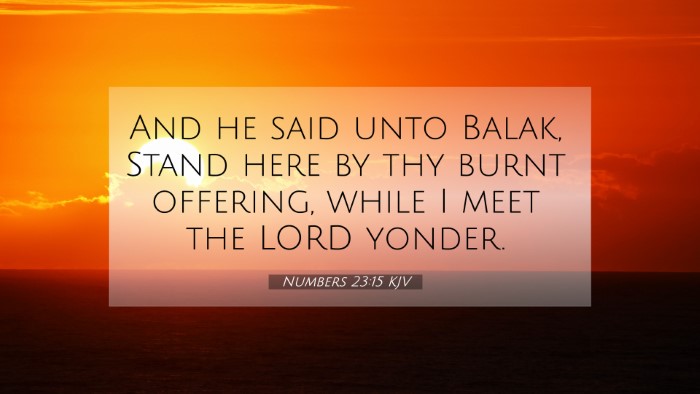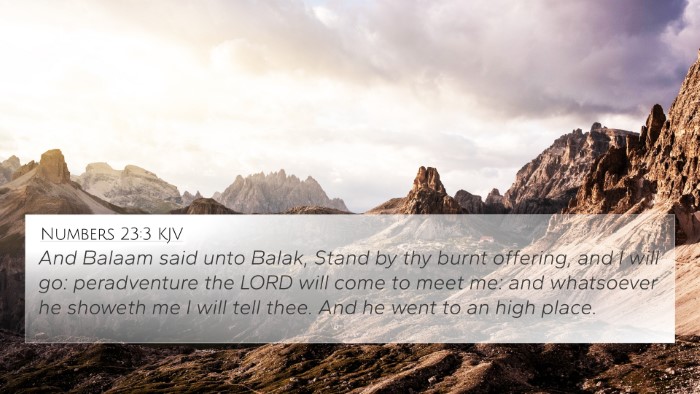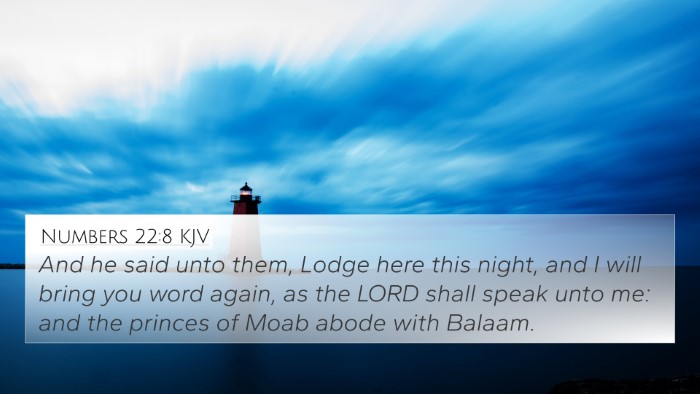Understanding Numbers 23:15
Numbers 23:15 says, "And he took up his parable, and said, Balak, the king of Moab, hath brought me from Aram, out of the mountains of the east, saying, Come, curse me Jacob, and come, defy Israel."
This verse is part of a larger narrative involving Balaam, a non-Israelite prophet, who was summoned by Balak, the king of Moab. The intent was to curse the Israelites as they journeyed through the wilderness towards the Promised Land.
Insights from Public Domain Commentaries
The insights from various commentaries provide a deeper understanding of this verse's theological significance and its implications in the Biblical narrative.
Matthew Henry's Commentary
Matthew Henry notes that Balaam’s parable begins with his acknowledgment of who sent him and for what purpose. The emphasis on the geographical context ("from Aram, out of the mountains of the east") highlights God's providence and the notion that blessings cannot be easily extinguished by mere curses.
Albert Barnes' Commentary
Albert Barnes elaborates on the paradox of Balaam, a prophet of God drawn into a scheme intended to undermine God's chosen people. His references to Jacob and Israel signify the intimate bond between God and His people. Barnes emphasizes that, despite human scheming, God's sovereignty prevails, and any attempt to curse what God has blessed is futile.
Adam Clarke's Commentary
Adam Clarke points out the cultural and historical significance of Balak's request, indicating the deep-seated fear of Israel within Moab. Clarke explains that by commissioning Balaam, Balak attempts to manipulate divine favor for his own ends, which ultimately illustrates the folly of opposing God's ordained plan for His people.
Cross-References to Numbers 23:15
- Deuteronomy 23:4 - Discusses how Moabites were perceived by Israel, providing background on the animosity.
- Genesis 12:3 - Highlights God's promise to Abraham that those who bless him will be blessed and those who curse him will be cursed.
- Joshua 24:9-10 - Refers to Balak's actions against Israel which relate back to this narrative.
- Romans 8:31 - Affirms that if God is for us, no one can stand against us, resonating with the futility of Balak's intentions.
- 2 Peter 2:15 - Calls Balaam as an example of someone who sought profit through cursing the people of God.
- Revelation 2:14 - Mentions the teaching of Balaam, indicating its ongoing impact even in the New Testament context.
- Jeremiah 48:10 - Discusses God’s plan against Moab, aligning his judgment with the narrative in Numbers.
Thematic Connections
This verse serves as a critical junction in understanding faithfulness versus manipulation in the context of divine sovereignty. The attempt to curse a people blessed by God highlights major themes such as the futility of opposing God’s plans, the integrity of prophetic voices, and the consequences of greed and ambition.
Key Themes Illustrated
- The Sovereignty of God: The assurance that God’s plans cannot be thwarted by human hands.
- Faithfulness in Prophecy: The role of prophets and their integrity in representing God's will.
- Conflict between Nations: Serve as a reminder of the ongoing struggles and political tensions concerning Israel.
Conclusion
In summary, Numbers 23:15 encapsulates key aspects of God’s relationship with Israel and His sovereign authority over nations. As Balaam prepares to deliver a curse, the deeper truth emerges that God’s blessing sustains His people, emphasizing the importance of faithfulness and divine protection amidst external threats. This verse invites readers to reflect on the implications of divine favor, the responsibilities bestowed upon prophets, and the assurance of God’s steadfast love and protection over His people.
Further Study Recommendations
For those looking to explore deeper connections in the Bible, employing tools for Bible cross-referencing such as a Bible concordance or cross-reference Bible study methods can enhance understanding. Engaging with scriptural cross-referencing will also facilitate a greater grasp of the inter-Biblical dialogue surrounding themes presented in this verse.




